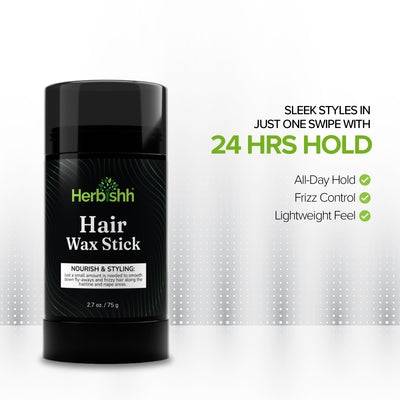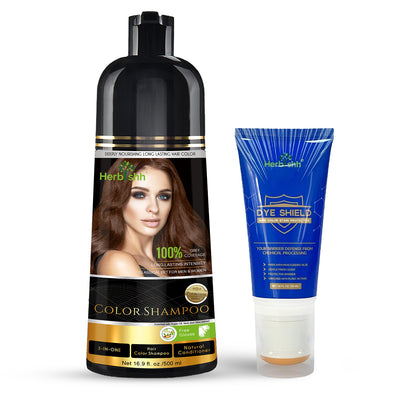Myth vs Truth; Natural Hair Products Always Work Better

Raise your hand if you hadn't felt that little rush when you spot “natural” labeled across a shampoo bottle? It feels trustworthy. Safe.
But do you know “natural” is one of the most misunderstood (and overhyped) words in hair care? We all want to do what’s right for our hair, but with every brand shouting about “herbal” this or “plant-powered” that, it’s easy to get lost.
So, let’s pull back the curtain. In this blog, we’ll bust the biggest myths, get real about what “natural” means. Let’s go.

What Does “Natural” Mean in Hair Care?
When we hear “natural,” most of us picture fresh aloe leaves, coconut milk, or maybe a grandma grinding hibiscus flowers in her backyard. But in reality? It’s rarely that simple.
There’s no strict rule about what counts as “natural” on your shampoo or oil bottle. Some brands will call a product natural just because it’s got a hint of plant extract mixed in with a long list of ingredients you can barely pronounce.
Sometimes, these “natural” products are super-processed before they land in your hands. Other times, a so-called “chemical” product is actually safer and gentler for your hair than something “natural.”
So what’s the takeaway?
Don’t get swept up in the marketing. Instead, flip the bottle and check the actual ingredients. Remember: what works for your hair might not come from a plant and that’s okay.

Common Myths About Natural Hair Products
Myth 1: Natural = Always Safe
It’s tempting to believe that if something is natural, it’s automatically gentle and good for everyone. But nature has its own set of surprises.
For example, pure essential oils can irritate your scalp, and some plant extracts can trigger allergies. Even the humble lemon juice so often praised in DIY hair hacks can dry out your hair and make it more sensitive to sunlight.
So, while “natural” sounds comforting, it’s not a guarantee that your hair or scalp will love it. Always patch test new products, and don’t be afraid to walk away if something doesn’t feel right.
Myth 2: Natural = More Effective
A product made with natural ingredients isn’t always going to work better than a science-backed synthetic formula
Sure, coconut oil and aloe vera can do wonders for some hair types, but for others? Not so much. Meanwhile, ingredients developed in a lab (like certain silicones or conditioning agents) can smooth frizz, repair damage, and protect your hair better than some natural oils ever could.
The best hair routine is personal. What “works” depends on your hair’s needs not just where an ingredient comes from.
Myth 3: Natural = No Side Effects
Wouldn’t it be nice if every plant-based ingredient was safe and gentle, yes we all want that. Sadly, nature can be unpredictable.
Some “natural” products can leave you with an itchy scalp, unexpected rashes, or even more hair fall than you started with. For example, tea tree oil works wonders for some, but can cause burning or irritation for others. Henna is natural but can seriously dry out hair if used too often or left on too long.
So, just because it came from a plant or tree doesn’t mean your hair and scalp will automatically love it. Listen to your body, and don’t be shy about ditching a product if it’s not making you feel good.
Myth 4: Natural = No Chemicals
So the reality is everything—including water and coconut oil—is made of chemicals.
The word “chemical” has gotten a bad rap, but it’s not the enemy. In fact, a lot of “natural” ingredients go through a ton of chemical processing before they land in your conditioner. And sometimes, lab-made ingredients are purer, more stable, and way safer than something drawn right from nature.
So don’t let “no chemicals” on the label fool you. It’s the quality, safety, and how your hair feels that matter not whether the ingredient was picked or poured.
What Science Really Says
So the truth is science doesn’t pick sides between “natural” and “synthetic.” What actually matters is whether an ingredient does its job safely and effectively.
Many natural ingredients are great like argan oil for moisture, or aloe vera for soothing the scalp. But there are also natural things that can be harsh, unpredictable, or even unsafe for some hair types. On the other hand, some ingredients made in a lab (like gentle surfactants or certain conditioners) have been tested for years, so we know how they work, how safe they are, and what results to expect.
The best products usually combine the wisdom of nature with the reliability of science. Instead of falling for labels, look for products that have real research behind them, not just pretty packaging or bold “100% natural” claims.

Examples of Both Good and Problematic “Natural” Actives
-
Good natural ingredients:
– Argan oil hydrates and adds shine without heaviness.
– Aloe vera calms irritation and can help balance the scalp.
– Coconut oil can help protect and strengthen hair, especially for those with thick or curly hair. -
Trickier natural ingredients:
– Lemon juice can lighten hair but also dry it out and make it sun-sensitive.
– Tea tree oil is helpful for dandruff but can irritate sensitive skin if not diluted.
– Essential oils in general may smell lovely but can cause allergies or irritation if overused.
So, even in nature’s pantry, it’s all about how, how much, and for whom an ingredient is used.

Smart Ways to Choose Hair Products
So, how do you cut through all the hype and find what actually works for your hair? Here are a few practical tips:
-
Read the whole ingredient list, not just the front label. “Natural” on the front doesn’t always tell the whole story.
-
Do a patch test. Even gentle-sounding ingredients can cause reactions, especially if your skin is sensitive.
-
Focus on your needs. If you have dry scalp look for hydrating and soothing ingredients. If you have fine hair go for lightweight formulas.
-
Don’t fear science. If a product combines a few smart lab-made ingredients with botanicals and it makes your hair feel amazing it’s a win.
-
Ask a pro if you’re unsure. A good hairstylist or dermatologist can help you pick what’s actually right for your hair and scalp, not just what’s trendy.
Conclusion
At the end of the day, “natural” is just a word and it doesn’t always equal better, safer, or more effective. The real magic happens when you find products that suit your unique hair.
Experiment, pay attention to how your hair feels, and don’t be afraid to mix a little science with your nature. The goal isn’t to be 100% natural or 100% synthetic and it’s to be 100% you.



















Leave a comment